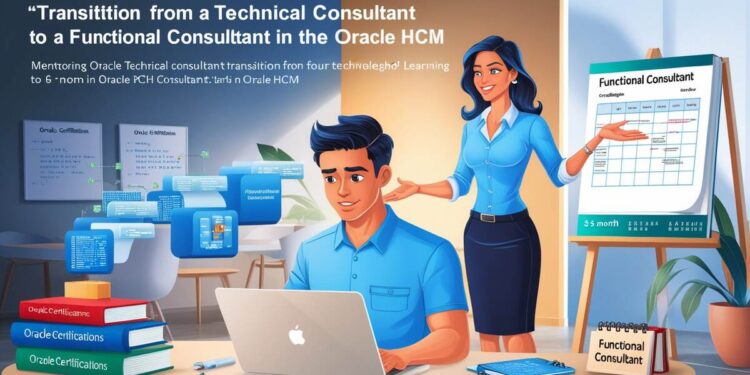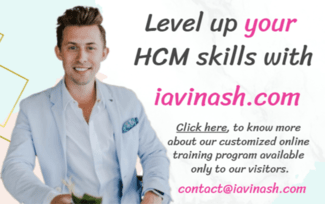Switching from Technical to Functional Consultant: A Story of Tarun and Fathima
Tarun, an Oracle HCM technical consultant, had spent the last seven years perfecting the art of integrations, fast formulas, and custom reports. While his technical expertise was unmatched, he often found himself curious about the business processes behind his tasks. He wanted to understand the “why” behind the “how.”
One morning, during a requirement-gathering session for a new Talent Management implementation, Tarun sat silently in the corner of the room. He was there to document the technical requirements, as usual. But his attention was on Fathima, the functional consultant leading the discussion.
Fathima’s Confidence in the Room
As Fathima led the meeting with her confident insights, Tarun couldn’t help but reflect on his own career journey. It reminded him of an article he recently read about career plateaus – a concept that explained the stagnation he sometimes felt. This moment of realization spurred his curiosity even more about transitioning into a functional role.
Fathima effortlessly engaged the client’s HR team, asking insightful questions about their employee development strategy and how they envisioned their career progression model. She sketched ideas on the whiteboard, connecting their needs to the functionalities of Talent Management. Tarun admired how she bridged technical capabilities with real business outcomes.
After the session, Tarun approached Fathima with a compliment:
“Fathima, the way you handled the meeting was amazing. You made it look so simple. I’ve always wanted to become a functional consultant, but I just never succeeded. How did you get here?”
Tarun’s Failed Attempts to Transition
Over coffee, Tarun opened up about his struggles.
“I’ve been thinking about switching to functional consulting for years. I even started learning Core HR setups once, but I couldn’t keep up. My workload was overwhelming, and I didn’t know where to start. Without proper guidance, I gave up. Honestly, I didn’t think it was possible for someone like me.”
Fathima nodded, smiling empathetically.
“I completely understand, Tarun. I was once in your shoes. I started as a technical consultant too, but the transition wasn’t easy. Let me share what worked for me.”
Challenges of Transitioning: A Shared Experience
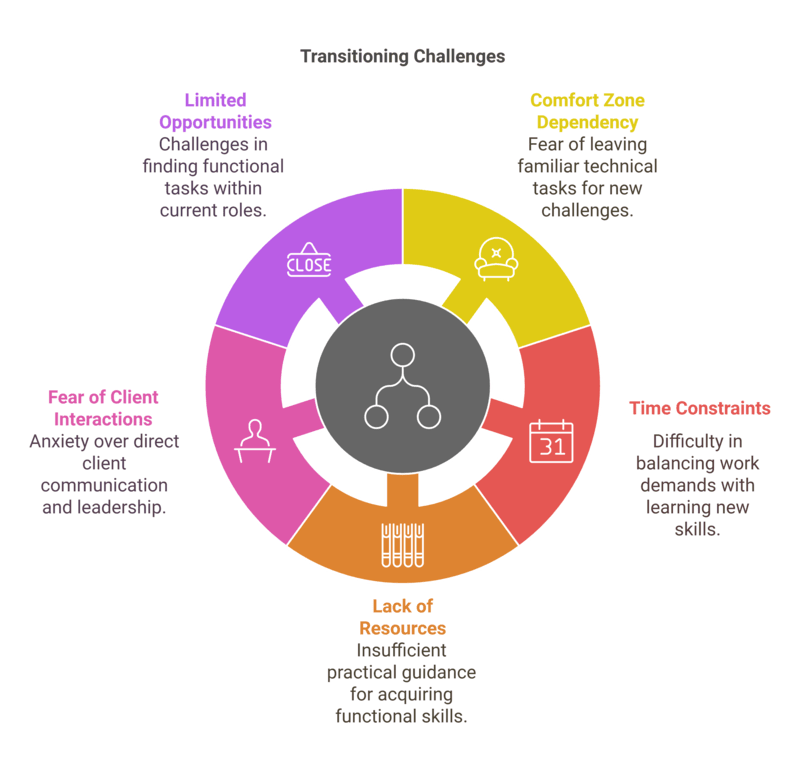
Together, Tarun and Fathima listed down the challenges that technical consultants face when planning to transition to functional roles:
- Comfort Zone Dependency:
Tarun: “I got so comfortable with coding and integrations that stepping into a functional role felt intimidating.”
Fathima: “Yes, the thought of leaving what you’re good at can be scary. But it’s also where growth happens.” - Time Constraints:
Tarun: “Between back-to-back projects and on-call support, I had no time to learn functional skills.”
Fathima: “This is common. Balancing learning with work demands requires prioritization.” - Lack of Resources:
Tarun: “I couldn’t find a clear learning path for functional skills. Most tutorials were too high-level or not practical enough.”
Fathima: “Functional knowledge can feel abstract until you connect it with hands-on practice.” - Fear of Client Interactions:
Tarun: “As a technical consultant, I rarely interact directly with clients. The idea of leading discussions like you did today feels overwhelming.”
Fathima: “It’s a skill you build over time. Start small, and you’ll gain confidence.” - Limited Opportunities in Current Role:
Tarun: “Even when I tried, I couldn’t find functional tasks within my projects.”
Fathima: “Sometimes, you have to proactively create those opportunities.”
Fathima’s Approaches to Transition
Fathima shared four strategic approaches Tarun could follow to begin his journey. She emphasized that the key was to pick an approach that aligns with his strengths, interests, and the opportunities available in his organization.
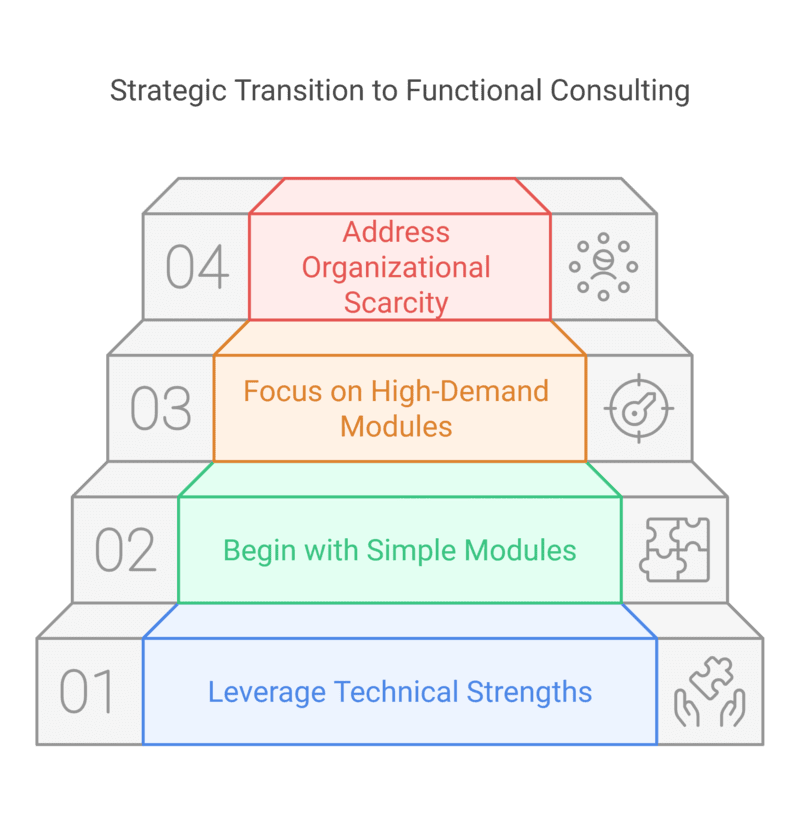
1. Start with a Module Where You Have Strong Technical Hold
“The easiest way to transition is to pick a module you’ve already worked on extensively as a technical consultant. For example, if you’ve been handling Core HR integrations, start by learning its functional setups and processes.”
Benefits:
- You already understand the data structures, APIs, and technical flows, making it easier to connect with functional concepts.
- You’ll gain confidence quickly since the module won’t feel entirely new.
- You can easily demonstrate your functional capabilities during ongoing projects.
Example:
If you’ve worked on Core HR integrations, learn the functional configurations like setting up legal entities, creating business units, and managing person types.
2. Pick a Module That’s Easy to Start With
“Some modules are inherently simpler to learn and configure, making them ideal for beginners in functional consulting. These modules typically involve straightforward setups and fewer complex business processes.”
Benefits:
- Accelerates your learning curve, as these modules are less overwhelming.
- Builds foundational functional skills, which you can apply to more complex modules later.
- Easy to practice in sandbox environments.
Example:
Modules like Oracle Recruiting Cloud (ORC) or Learning are relatively easier to grasp compared to other complex modules. Their concepts are global, easy to understand, and relatable to everyone’s own lifecycle, as most people have gone through recruiting and learning processes themselves.
3. Choose a High-Demand Module in the Market
“If your goal is to increase your market value, focus on modules that are in high demand, like Compensation Management or Absence Management. These modules are often requested by clients due to their significance in handling critical organizational processes.”
Benefits:
- Opens up more job opportunities and makes you a sought-after resource.
- Helps you stay relevant in the rapidly evolving Oracle HCM landscape.
- Positions you as a consultant who understands strategic HR needs.
Example:
Learn how to configure compensation plans and absence policies in Compensation Management and Absence Management, as these are critical to ensuring smooth payroll processing and employee satisfaction.
4. Target a Module with Scarcity in Your Organization
“If your organization struggles to find functional consultants for a specific module, you’re more likely to be given opportunities in that area. Use this to your advantage by learning those modules.”
Benefits:
- Increases your chances of getting functional tasks assigned within your current role.
- Makes you indispensable for projects requiring that module.
- Gives you a unique edge within your team.
Example:
If your organization lacks consultants skilled in Oracle Time and Labor (OTL), learn how to configure time card layouts, rules, and approvals to fill that gap..
Building the Roadmap
With these approaches in mind, Fathima helped Tarun craft a detailed and actionable roadmap to transition successfully from a technical to a functional consultant.
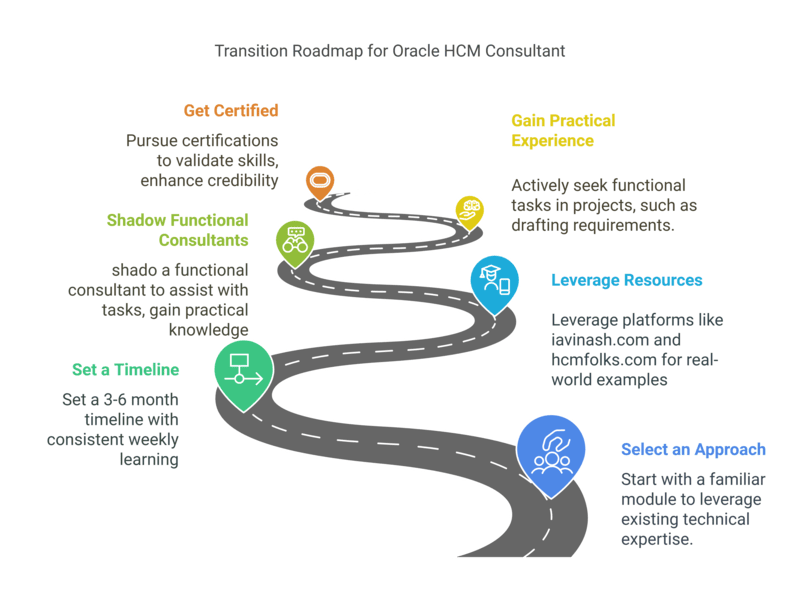
Step 1: Select an Approach
Tarun decided to begin with Core HR, as he already had strong technical knowledge of its data structures and integrations. This approach ensured that he started with a familiar module, making the transition less intimidating.
Step 2: Set a Timeline
Tarun committed to a 3-6 month timeline for his transition, dedicating specific hours each week for learning and practical experience. Fathima emphasized that consistency was key, even if he could only manage 30 minutes a day during busy project cycles.
Step 3: Leverage Learning Resources
Fathima recommended Tarun explore platforms like iavinash.com and hcmfolks.com, which offer invaluable resources tailored to Oracle HCM consultants. These platforms provide real-world examples, simplified learning paths, and active community forums where consultants can ask questions and get answers from experienced professionals. She emphasized that engaging in these communities would help Tarun build connections, clarify doubts, and stay updated on the latest functional practices.
Step 4: Shadow Functional Consultants
Discuss with your manager about becoming a shadow resource for a functional consultant on a project. This can be a win-win for both you and the project team. As a shadow resource, you can assist with documentation, help during requirement-gathering sessions, and observe how functional consultants translate client needs into system configurations.
This approach not only allows you to gain practical knowledge but also demonstrates your proactive attitude and willingness to grow. By taking on smaller functional tasks under the guidance of a senior consultant, you’ll build confidence and gradually transition into a functional role.
Step 5: Gain Practical Experience
Fathima encouraged Tarun to actively seek out functional tasks within ongoing projects. He volunteered to draft requirement documents and configure small setups, like approval workflows and business units in Core HR. For sandbox practice, Tarun focused on creating mock configurations for new hires, absence plans, and compensation structures.
Step 6: Get Certified
To validate his skills and build credibility, Tarun pursued the Oracle Global Human Resources Cloud Implementation Specialist certification. This not only enhanced his resume but also gave him a structured path to master Core HR configurations and related functionalities.
Fathima reminded Tarun that certifications are a strong differentiator when applying for hybrid or purely functional roles.
With these approaches in mind, Fathima helped Tarun craft a practical roadmap:
- Select an Approach: Tarun chose to start with Core HR, as he already had strong technical knowledge of its processes.
- Set a Timeline: Dedicate 3-6 months to transition, focusing on learning, practicing, and shadowing.
- Leverage Resources: Explore platforms like iavinash.com and hcmfolks.com, which offer invaluable resources tailored to Oracle HCM consultants.
- Shadow Functional Consultants: Partner with functional team members during requirement-gathering sessions and observe how they translate client needs into configurations.
- Gain Practical Experience: Volunteer for functional tasks in ongoing projects, such as setting up approval workflows or creating employee lifecycle scenarios in Core HR.
- Get Certified: Pursue certifications like the Oracle Global Human Resources Cloud Implementation Specialist to validate your knowledge.
Final Thoughts
As they finished their discussion, Fathima smiled and said:
“Tarun, the first step is always the hardest, but once you start, it gets easier. Remember, your technical background isn’t a limitation—it’s your strength. Use it to build a unique skill set, and soon enough, you’ll be bridging the gap between technical and functional like a pro.”
Inspired, Tarun began his transition journey with renewed confidence, knowing he had a clear plan and the right guidance.
Switching to a functional consultant role may be challenging, but with actionable steps, dedication, and the right mindset, it’s entirely possible to achieve. So, which approach will you take to begin your journey


